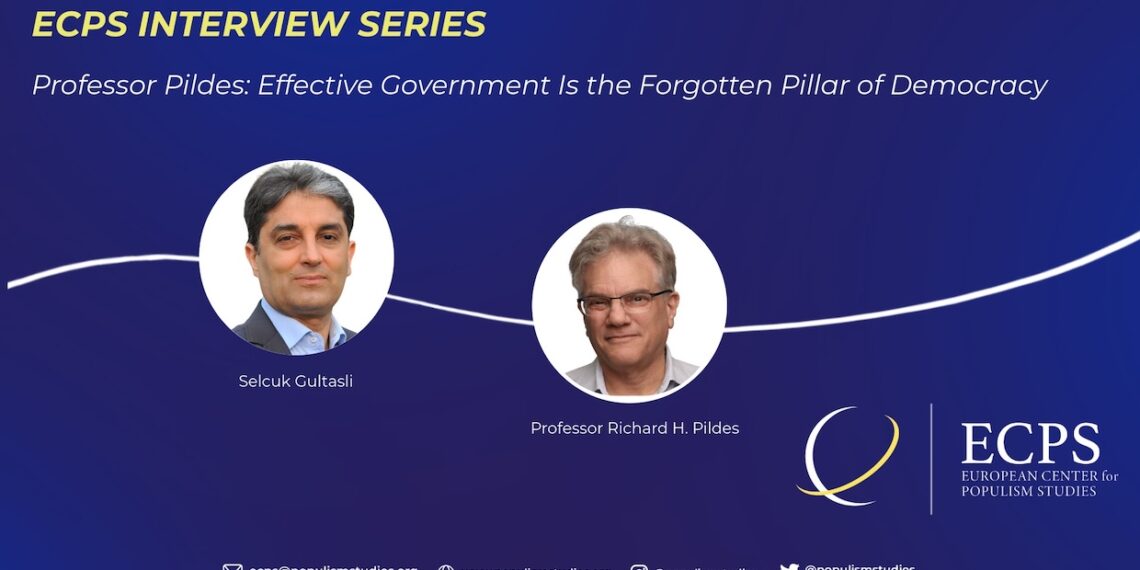In an interview with the ECPS, Professor Richard H. Pildes, one of America’s leading constitutional scholars, warns that democracy’s survival depends not only on equality and participation but also on its capacity to deliver effective governance. “Democracy,” he says, “rests on two simple promises: equal voice and better lives. When governments fail in that second task, it profoundly undermines democracy itself.” Professor Pildes argues that excessive focus on participation, coupled with digital fragmentation and weakened political parties, have eroded governments’ ability to act decisively. The rise of “free-agent politicians,” algorithmic outrage, and social media-driven polarization, he cautions, threaten to make democracy less capable of solving problems. “Effective government,” Professor Pildes insists, “is the forgotten pillar of democracy.”
Interview by Selcuk Gultasli
In a wide-ranging interview with the European Center for Populism Studies (ECPS), Professor Richard H. Pildes, the Sudler Family Professor of Constitutional Law at New York University School of Law and one of the foremost scholars of constitutional and democratic theory, reflects on one of the most neglected yet urgent dimensions of democratic life: the capacity to govern effectively.
Professor Pildes argues that modern democracies have grown dangerously unbalanced by emphasizing participation and representation—the “inputs” of democracy—while neglecting its “outputs,” namely the ability of governments to deliver results that improve citizens’ lives. As he puts it, “I often think of democracy, and what justifies it, as resting on two simple promises. First, democracy promises to treat citizens as equals—with equal standing, equal voice, and equal moral worth. Second, it promises to make their lives better.” When democratic governments fail at that second task, he warns, “it profoundly undermines the justification and purpose of democracy itself.”
Throughout the interview, Professor Pildes develops this theme of effective government as democracy’s forgotten pillar, linking it to rising polarization, social media dynamics, and the fragmentation of political authority. “Neglecting the value of effective government,” he observes, “is one of the greatest challenges of our time. Perhaps the fundamental challenge for contemporary democracies is to demonstrate that they can once again deliver for their citizens.”
Professor Pildes identifies digital fragmentation as one of the defining forces reshaping democratic governance. The communications revolution, he explains, has made it “incredibly easy to mobilize opposition to whatever government is doing,” eroding the stability of political institutions and making compromise more elusive. Social media and algorithmic amplification have “flattened political authority,” giving rise to spontaneous, leaderless movements but also fueling paralysis in democratic decision-making.
He also traces how the decline of strong political parties has weakened democracy’s capacity to build coalitions and sustain coherent governance. Whereas parties once mediated between citizens and the state, today’s hyper-pluralist media ecosystems and privatized campaign finance systems have encouraged the rise of “free-agent politicians”—performative figures who bypass party structures to cultivate online followings and raise funds directly from polarized small donors.
Looking ahead, Professor Pildes cautions that the structural fragmentation produced by digital media cannot be easily reversed: “The genie is out; you can’t really go back.” Yet, he insists that democracies must learn to manage these forces more effectively if they are to regain public trust and legitimacy. “Democracy,” he concludes, “must prove that it can still deliver—by governing effectively, addressing citizens’ needs, and meeting the great challenges of our time.”


